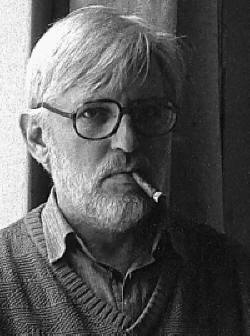

Queer Places:
Lycée Charlemagne, 14 Rue Charlemagne, 75004 Paris
 Bernard Dort (Metz, 29 September 1929 - Paris 14th, 5 May 1994) is a French academic, theorist, translator and theatre practitioner, writer and essayist.
Bernard Dort (Metz, 29 September 1929 - Paris 14th, 5 May 1994) is a French academic, theorist, translator and theatre practitioner, writer and essayist.
Bernard Dort was born on 29 September 1929 in Metz. After the death of his mother and the beginning of the Second World War, he was taken in by an aunt in Noyon and then, during the German occupation, he was a boarder at the Lycée d'Auch. He completed his secondary education at the Lycée Charlemagne in Paris. He began studying law in 1945 until graduating from the Institute of Political Studies and from 1951 to 1953 he continued his studies at the École nationale d'administration. From 1953 to 1963, he served as a civil administrator at the Ministry of Health and Population. But he was already passionate about opera, cinema (he would be linked for a while with all the animators of the Nouvelle Vague and Cahiers du cinéma, but the "left-wing Hollywoodian", as he liked to call himself, would soon make a political break with them) and especially by the theater: in 1950, he wrote his first articles in Modern Times (where, in 1954, he defended in particular Les Gommes by Alain Robbe-Grillet), and in Les Cahiers du Sud, where he discovered almost single-handedly Michel Butor, Jean Cayrol, Paul Gadenne or Bernard Pingaud, and where he also wrote about the Festival international d'art lyrique d'Aix-en-Provence and opera, which was not common at the time. He contributed to L'Express from 1953 to 1955, to France-Observateur between 1952 and 1954. In 1960, he signed the Manifesto of the 121, a declaration on the "right to insubordination" in the context of the Algerian war. With Roland Barthes, he co-directs the popular theatre review, of which he remained an editorial member from the first to the last issue (1953-1964). It was especially there that, after having attended, in June 1954 and in the company of Roland Barthes, the performances of Bertolt Brecht's Mutter Courage und ihre Kinder, with the Berliner Ensemble on tour, at the Sarah Bernhardt Theatre, he soon became one of the main architects of Brecht's knowledge of the theatre, at the same time as he contributed to the study of great contemporary authors such as Jean Genet or Arthur Adamov. In 1961, he was thirty-two years old when he defended his doctoral thesis on Bertolt Brecht, which opened the doors of the Institut d'études théâtrales de Paris III in 1962, where he taught until 1981 (and which he even directed for some time). His students were Valère Novarina, Patrice Chéreau, Jean-Pierre Vincent and Jacques Lassalle. In 1976, he held the professorship in aesthetics and art science (theatre). Between 1981 and 1988, he was appointed professor at the Conservatoire national supérieur d'art dramatique de Paris. Begun in his youth, his activity in periodicals does not stop. In 1971, he founded the magazine Travail théâtral which will appear until 1979. He contributed to Le Monde-Dimanche (from 1980 to 1984) and to the Cahiers de la Comédie-Française, then a quarterly review of the Comédie-Française from 1991 to 1993. He met his former student, Jacques Lassalle, at the National Theatre of Strasbourg where he was the literary advisor, which provided him with the opportunity to translate several plays such as Woyzeck by Georg Büchner, Emilia Galotti by Lessing or Rosmersholm by Henrik Ibsen (in collaboration with his former student Terje Sinding). From 1988 to 1989, he was appointed Director of Theatre and Entertainment at the Ministry of Culture. He died in Paris on May 5, 1994, leaving behind the admiration of his students and a considerable body of work.
My published books: